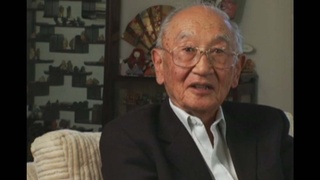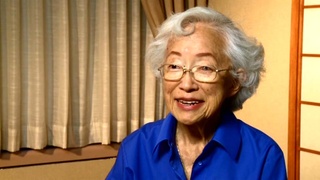Interviews
Neighbors' sympathy after Pearl Harbor
Well we had a retail florist right near University of Southern California, and my father when he first came here, he said “as long as you are in the United States of America, you deal with American people.” So we purposely stayed out of J-town. And most of our clientele was Americans. And so when we opened up, we were wondering whether if we should open up a business on a Monday, the following Pearl Harbor. But we did. And it, we had expressions of sympathy from our Lutheran Church people, and the Methodist Church people, and my Hakujin customers were very very sympathetic and they said anything that they can do to help us, they were willing to help us. So we didn’t have any problems there at that time.
Date: November 15, 2000
Location: New York, United States
Interviewer: John Esaki
Contributed by: Watase Media Arts Center, Japanese American National Museum
Explore More Videos

Lost respect for the flag after incarceration
(1913-2013) Doctor specializing in obstetrics in Southern California

Traumatic experiences before camp
(1913-2013) Doctor specializing in obstetrics in Southern California

Joining the hospital unit in Santa Anita Race Track
(1913-2013) Doctor specializing in obstetrics in Southern California

“Everybody went in like sheep”
(1913-2013) Doctor specializing in obstetrics in Southern California

The horror of Hiroshima after the atomic bombing (Japanese)
(1928 - 2008) Drafted into both the Japanese Imperial Army and the U.S. Army.

Finding out Roosevelt wanted Japan to attack
(1919-2020) Member of the 1800th Engineering Battalion. Promoted Japan-U.S. trade while working for Honda's export division.

Parents expected to be taken by the FBI
(1919-2020) Member of the 1800th Engineering Battalion. Promoted Japan-U.S. trade while working for Honda's export division.

525 Quartermaster Corps
(1919-2020) Member of the 1800th Engineering Battalion. Promoted Japan-U.S. trade while working for Honda's export division.

Fort McClellan soldiers
(1919-2020) Member of the 1800th Engineering Battalion. Promoted Japan-U.S. trade while working for Honda's export division.


Discrimination for Nisei doctors
(1928–2016) Daughter of an Issei doctor

Going to camp with the Terminal Island people
(1927-2010) Political Activist


Interned at age fifteen, I saw camp as an adventure
(1927-2010) Political Activist

